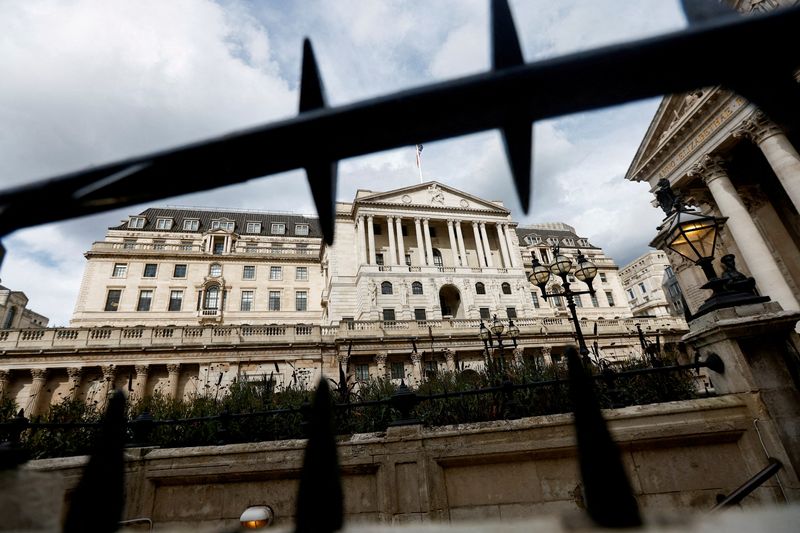The Bank of England could cut rates next week, Deutsche Bank says. Here’s why.
By Jonathan Cable
LONDON (Reuters) - The Bank of England is likely done with policy tightening and will leave Bank Rate at 5.25% on Nov. 2, according to the vast majority of economists polled by Reuters who did however caution the chance of another increase this year was high.
Although inflation unexpectedly held steady at 6.7% in September, the highest of any major advanced economy, 61 of 73 economists in the Oct. 18-23 poll said there would be no move from the Bank next week, in line with market expectations.
"The Bank kept rates on hold in September and there hasn't really been much data since then to change that position. And the data we have had - wages, inflation - wasn't that different to what everybody expected," said James Smith at ING.
"The bigger picture is the impact of previous hikes is still coming through."
Only 12 economists forecast a quarter point rise to 5.50% at the November Monetary Policy Committee meeting.
However, 16 of 28 who answered an additional question said the chance of another lift this year was high. Despite 515 basis points of hikes since December 2021, inflation is still more than three times the BoE's 2% target.
"At some point, when it is more comfortable that core and services inflation are on an established downtrend, the MPC may want to switch to a more neutral guidance. But we don't think it will be ready to make that change just yet," noted Elizabeth Martins at HSBC (LON:HSBA).
September's inflation data was not far off what the Bank had expected, BoE Governor Andrew Bailey said last week, adding a slowdown in core inflation, which strips out volatile food and energy prices, was "quite encouraging".
Inflation was expected to gradually decline across the forecast horizon but it won't reach target until Q2 2025, the poll showed. It will average 3.0% next year and 2.2% in 2025.
The first cut to Bank Rate won't come until at least July, the majority of economists said, with a median prediction for a 25 basis point reduction in the third quarter. Around one-third of economists expected the Bank to act earlier.
That median expectation would put it slightly behind the United States Federal Reserve, which a separate Reuters poll narrowly suggested would begin easing in Q2, but in step with the European Central Bank's likely time scale.
The BoE was forecast to reduce Bank Rate by 50 basis points in the fourth quarter, putting it at 4.50% by year-end.
SLOWLY, SLOWLY
Britain will dodge a recession, median forecasts showed, but the outlook was weak. Having likely contracted 0.1% last quarter it will flatline in this one and eke out only 0.1% growth in the first two quarters of next year.
"It's a story of very slow growth over the next few quarters rather than an outright meaningful recession," ING's Smith said.
Still, a closely watched purchasing managers survey due later on Tuesday is expected to show business activity shrank again this month.
In the latest Reuters poll, 12 of 31 economists had a recession - two consecutive quarters of contraction - as their base case compared with eight of 23 in a September poll.
Across 2024 growth was put at 0.4% but the economy will rebound the following year and expand 1.4%, slightly weaker than the 0.5% and 1.5% medians, respectively, published in last month's poll.
